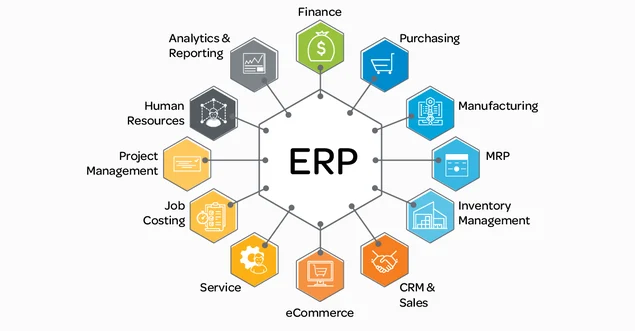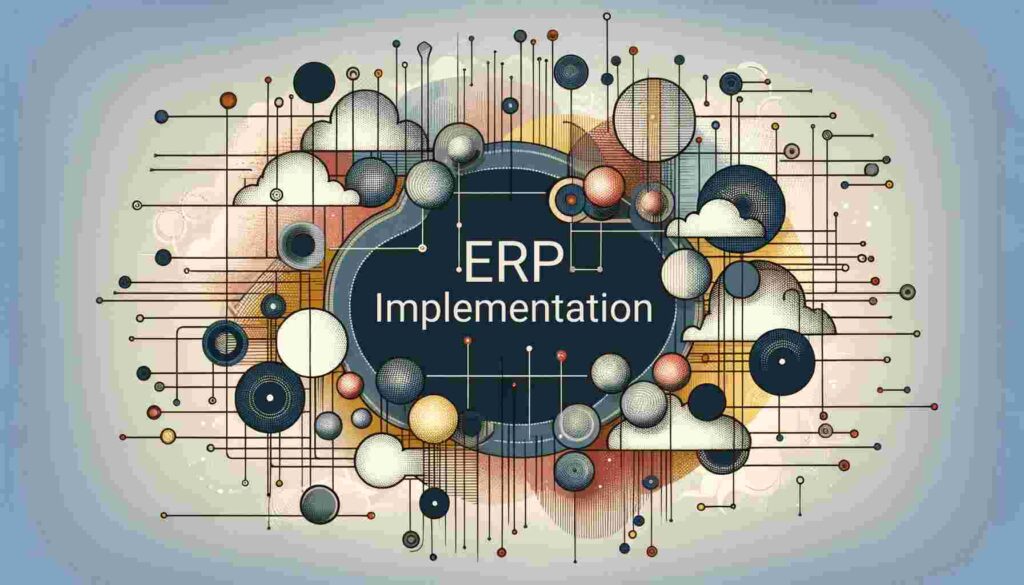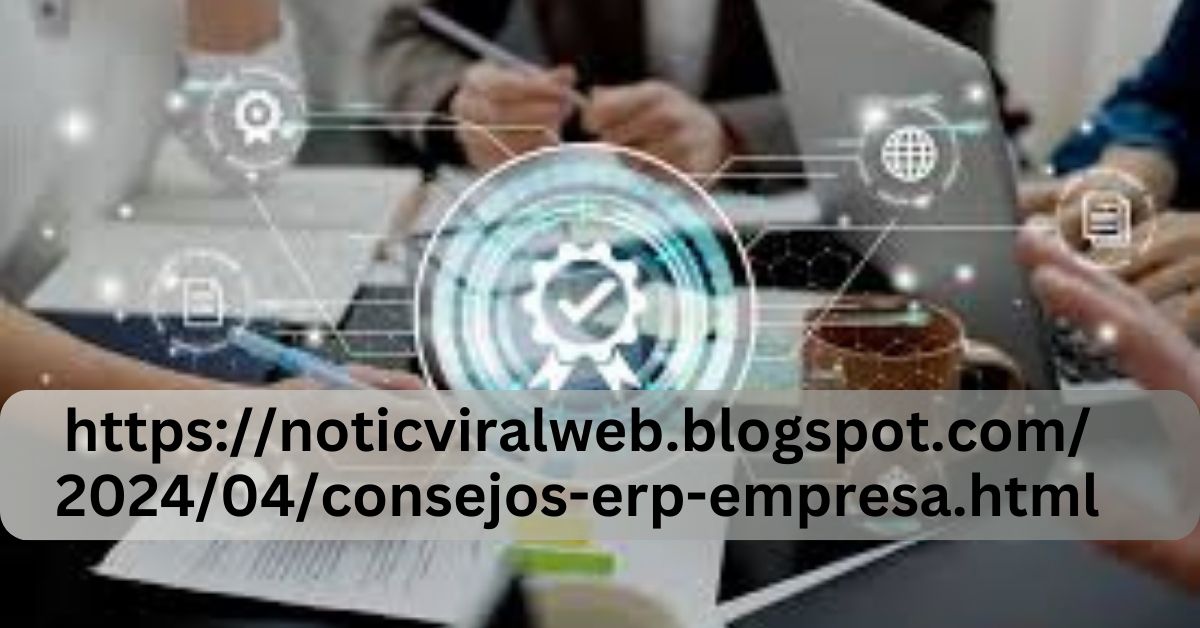ERP (Enterprise Resource Planning) is software that integrates and manages a company’s core business processes, including finance, HR, and supply chain, into a unified system.
This integration helps businesses reduce operational costs, improve data accuracy, and ensure seamless information flow across the organization.
What Is Erp?
ERP stands for Enterprise Resource Planning. It refers to a category of software that helps businesses manage and integrate their core functions . An ERP system integrates data and processes from various departments into a single unified system, enabling real-time data access and improved coordination https://noticviralweb.blogspot.com/2024/04/consejos-erp-empresa.html.

ERP systems typically cover modules such as finance, human resources, supply chain management, inventory management, manufacturing, and customer relationship management. This integration facilitates improved decision-making, operational efficiency, and better resource management.
Benefits Of Erp Systems
Improved Efficiency:
ERP systems automate routine tasks, reducing manual effort and errors. This automation streamlines business processes and enhances productivity.
Better Decision-Making:
With real-time data and analytics, ERP systems provide valuable insights into business performance, helping managers make informed decisions.
Enhanced Data Accuracy:
Centralized data storage ensures that information is consistent, accurate, and accessible across the organization https://noticviralweb.blogspot.com/2024/04/consejos-erp-empresa.html, reducing the risk of discrepancies.
Cost Savings:
By optimizing processes and improving resource management, ERP systems can lead to significant cost reductions in areas such as inventory, procurement, and operations.
Scalability:
ERP systems are designed to grow with your business. They can accommodate increased complexity and volume as your organization expands.
Regulatory Compliance:
ERP systems help organizations adhere to industry regulations by maintaining accurate records and generating compliance reports.
Read Also:
Https://Guia-Automovil.Com/2020/10/07/Los-3-Mejores-Autos-Clasicos-De-Ford – A Simple Guide!
Key Features Of Erp Systems:
- Integrated Modules: ERP systems integrate various business functions into a single platform, including finance, HR, supply chain, manufacturing, and CRM.
- Real-Time Data
- Access: Users can access real-time information across different departments, facilitating timely decision-making and coordination.
- Automation: Routine tasks such as data entry, report generation, and workflow management are automated, reducing manual effort and errors.
- Customization: ERP systems offer customization options to tailor the software to the specific needs of an organization, allowing for flexibility in processes and reporting.
- Reporting and Analytics: Advanced reporting and analytics tools provide insights into business performance, trends, and opportunities for improvement.
- User-Friendly Interface: Modern ERP systems feature intuitive interfaces that improve user experience and ease of use.
Types Of ERP Systems:
On-Premises ERP:
Installed locally on a company’s servers, on-premises ERP systems offer greater control over data and customization but require significant upfront investment and maintenance.
Cloud-Based ERP:
Hosted on remote servers and accessed via the internet, cloud-based ERP systems offer scalability, lower initial costs, and reduced IT maintenance, making them suitable for businesses of all sizes.
Hybrid ERP:
Combines elements of both on-premises and cloud-based ERP systems, allowing businesses to use a mix of local and cloud-based solutions based on their needs.
Industry-Specific ERP:
Tailored to meet the unique requirements of specific industries, such as manufacturing, retail, or healthcare https://noticviralweb.blogspot.com/2024/04/consejos-erp-empresa.html, these ERP systems provide specialized functionalities and features.
Challenges In Implementing Erp Systems:
High Costs:
Implementing an ERP system involves significant costs, including software licenses, hardware, consulting fees, and training.
Complexity:
The complexity of ERP systems can lead to challenges in configuration, customization, and integration with existing systems.
Resistance to Change:
Employees may resist adopting new systems due to changes in workflow or fear of the unknown, which can impact user adoption and effectiveness.
Data Migration Issues:
Migrating data from legacy systems to the new ERP system can be challenging and may result in data inconsistencies or loss if not managed carefully.
Customization Challenges:
Tailoring the ERP system to fit specific business processes can be complex and may require additional resources and time.
Ongoing Maintenance:
ERP systems require continuous maintenance, updates, and support to ensure they remain functional and aligned with business needs.
Best Practices For Successful Erp Implementation:
Define Clear Objectives:
Establish clear goals and objectives for the ERP implementation to guide the process and measure success.
Involve Key Stakeholders:
Engage representatives from various departments to gather input and ensure the system meets the needs of all users.
Conduct a Thorough Needs Analysis:
Assess the organization’s current processes and identify areas for improvement to select the most suitable ERP system https://noticviralweb.blogspot.com/2024/04/consejos-erp-empresa.html.
Plan the Implementation Process:
Develop a detailed implementation plan that outlines tasks, timelines, and responsibilities to ensure a smooth deployment.
Choose the Right Implementation Partner:
Select a reputable implementation partner with experience in your industry to support the deployment and customization of the ERP system.

Develop a Data Migration Strategy:
Create a plan for migrating data from legacy systems, including data cleaning, mapping, and validation https://noticviralweb.blogspot.com/2024/04/consejos-erp-empresa.html.
Provide Comprehensive Training:
Offer extensive training to users to ensure they are proficient in using the new ERP system and can leverage its features effectively.
Test the System Thoroughly:
Conduct thorough testing of the ERP system before going live to identify and address any issues.
Case Studies Of ERP Implementation:
1. Case Study: Streamlining Supply Chain Management
Company A implemented an ERP system to optimize its supply chain management. By integrating inventory, procurement, and logistics into a single system, the company achieved significant cost savings and improved efficiency https://noticviralweb.blogspot.com/2024/04/consejos-erp-empresa.html. Real-time visibility into inventory levels and supplier performance enhanced demand forecasting and stock management.
2. Case Study: Enhancing Customer Service
Company B used an ERP system to enhance its customer service operations. The system integrated customer information from multiple touchpoints, providing a unified view of each customer https://noticviralweb.blogspot.com/2024/04/consejos-erp-empresa.html. This integration enabled personalized service, quicker issue resolution, and improved customer satisfaction.
3. Case Study: Improving Financial Management
Company C adopted an ERP system to streamline its financial management processes. Automation of accounting tasks, real-time financial reporting, and improved data accuracy led to better financial decision-making and overall performance . The company also benefited from enhanced regulatory compliance and audit trails https://noticviralweb.blogspot.com/2024/04/consejos-erp-empresa.html.
Read Also:
Myhtspace – What You Need to Know!
Future Trends In Erp Systems:
AI and Machine Learning Integration:
ERP systems are increasingly incorporating artificial intelligence (AI) and machine learning to enhance automation, predictive analytics, and decision-making capabilities.
Cloud-Native Solutions:
Cloud-based ERP systems are evolving with advanced features and greater scalability, offering businesses more flexibility and reduced IT overhead .
Mobile Access:
ERP systems are increasingly offering mobile access, allowing users to perform tasks and access information from smartphones and tablets , enhancing productivity and flexibility.
IoT Integration:
Integration with the Internet of Things (IoT) is enabling real-time data collection and analysis from connected devices https://noticviralweb.blogspot.com/2024/04/consejos-erp-empresa.html, improving operational visibility and efficiency.
Advanced Analytics:
ERP systems are incorporating advanced analytics tools to provide deeper insights into business performance, trends, and opportunities for growth.
Enhanced User Experience:
Modern ERP systems are focusing on improving user experience with intuitive interfaces, customizable dashboards, and better integration with other tools.
Conclusion:
ERP systems play a crucial role in modern businesses by integrating and streamlining core processes, improving efficiency, and enhancing decision-making. While implementing an ERP system comes with its challenges, following best practices and learning from real-world case studies can lead to successful deployment and significant benefits.
FAQ’s:
Q: What are the main benefits of ERP systems?
A: The main benefits of ERP systems include improved efficiency, better decision-making, enhanced data accuracy, cost savings, scalability, and regulatory compliance.
Q: How do I choose the right ERP system for my business?
A: To choose the right ERP system, assess your business needs, evaluate system features and compatibility, consider scalability and flexibility, and review costs and potential ROI.
Q: What are common challenges in ERP implementation?
A: Common challenges include high costs, complexity, resistance to change, data migration issues, customization challenges, and ongoing maintenance requirements.
Q: How can I ensure a successful ERP implementation?
A: Ensure success by defining clear objectives, involving key stakeholders, conducting a thorough needs analysis, planning the implementation process, choosing the right implementation partner, developing a data migration strategy, providing comprehensive training, and testing the system thoroughly.
Q: What are future trends in ERP systems?
A: Future trends include AI and machine learning integration, cloud-native solutions, mobile access, IoT integration, advanced analytics, and enhanced user experience.
Read More:
Dagesteron – Promising Results For Pain Relief!



